Results 1 to 1 of 1
Thread Information
Users Browsing this Thread
There are currently 1 users browsing this thread. (0 members and 1 guests)
-
09-03-2013, 11:57 AM #1
House leaders back Obama on Syria
House leaders back Obama on Syria
By Ed Payne. Josh Levs, and Laura Smith-Spark, CNN
updated 11:45 AM EDT, Tue September 3, 2013
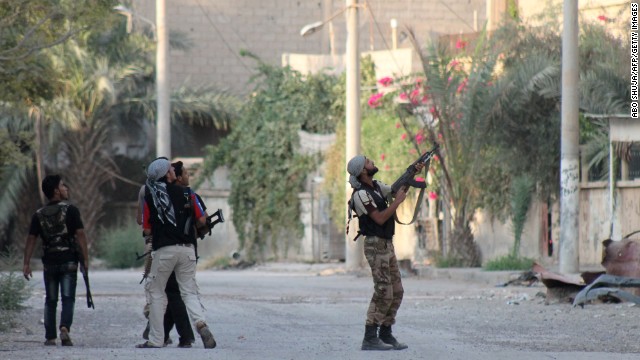 A rebel fighter points his weapon at Syrian regime forces in Deir ez-Zor, on Monday, September 2. President Barack Obama has gone to Congress to get approval for possible military intervention in Syria. Tensions in Syria began to flare in March 2011 and escalated into an ongoing civil war. Click through to view the most compelling images taken since the start of the conflict:
A rebel fighter points his weapon at Syrian regime forces in Deir ez-Zor, on Monday, September 2. President Barack Obama has gone to Congress to get approval for possible military intervention in Syria. Tensions in Syria began to flare in March 2011 and escalated into an ongoing civil war. Click through to view the most compelling images taken since the start of the conflict:
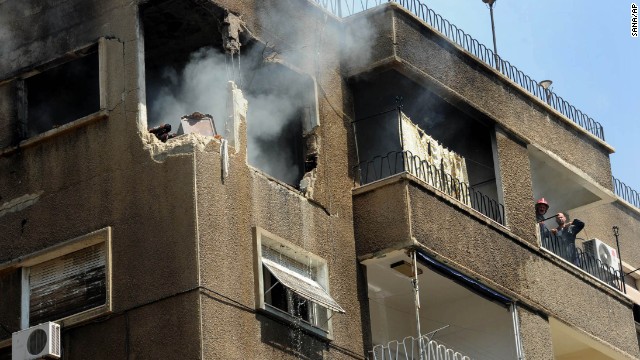 Syrian firefighters try to extinguish a fire after a missile hit a residential building in Damascus, Syria, on September 2.
Syrian firefighters try to extinguish a fire after a missile hit a residential building in Damascus, Syria, on September 2.
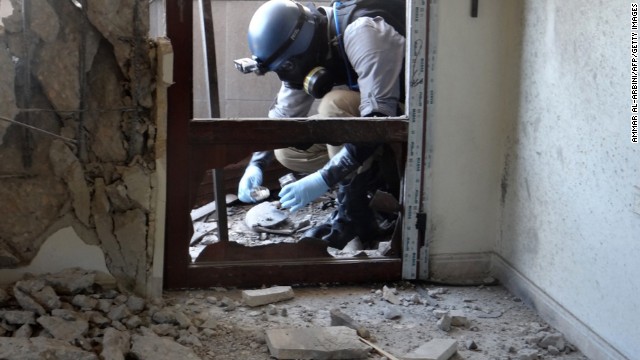 A U.N. arms expert collects samples during an inspection of a suspected chemical weapons strike site in the Ghouta area outside Damascus on August 29.
A U.N. arms expert collects samples during an inspection of a suspected chemical weapons strike site in the Ghouta area outside Damascus on August 29.
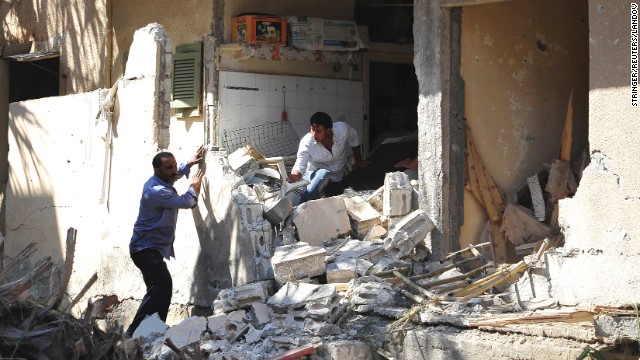 People search for belongings in rubble in Raqqa, Syria, on August 29.
People search for belongings in rubble in Raqqa, Syria, on August 29.
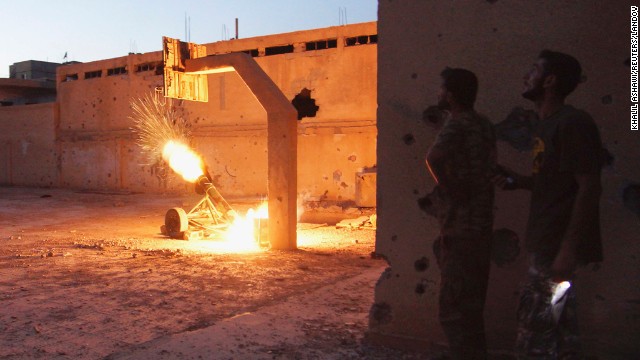 Free Syrian Army fighters launch a rocket toward forces loyal to Syrian President Bashar al-Assad in Deir Ezzor on August 29.
Free Syrian Army fighters launch a rocket toward forces loyal to Syrian President Bashar al-Assad in Deir Ezzor on August 29.
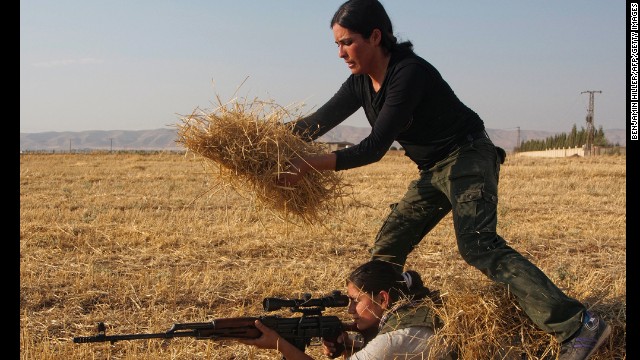 A Syrian Kurd uses hay to hide another woman in a training session organized by the Kurdish Women's Defense Units on Wednesday, August 28, in a northern Syrian border village. They're preparing if the area comes under attack.
A Syrian Kurd uses hay to hide another woman in a training session organized by the Kurdish Women's Defense Units on Wednesday, August 28, in a northern Syrian border village. They're preparing if the area comes under attack.
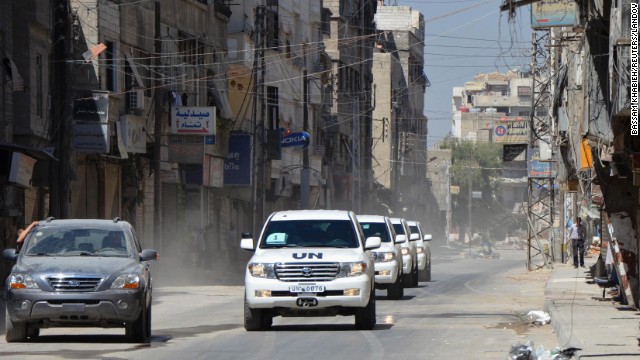 Free Syrian Army fighters escort U.N. vehicles with chemical weapons experts on August 28 through a site of a suspected chemical weapons attack outside Damascus.
Free Syrian Army fighters escort U.N. vehicles with chemical weapons experts on August 28 through a site of a suspected chemical weapons attack outside Damascus.
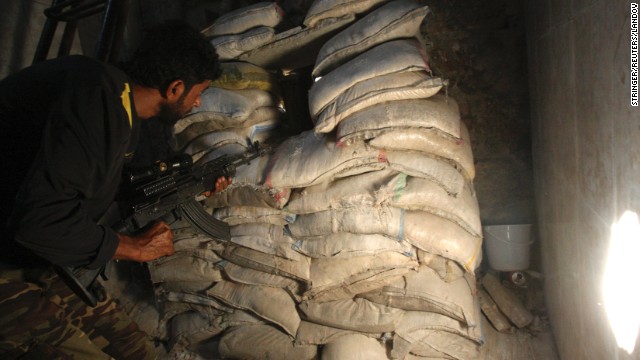 A Free Syrian Army fighter takes position behind sandbags in the old city of Aleppo, Syria, on Tuesday, August 27.
A Free Syrian Army fighter takes position behind sandbags in the old city of Aleppo, Syria, on Tuesday, August 27.
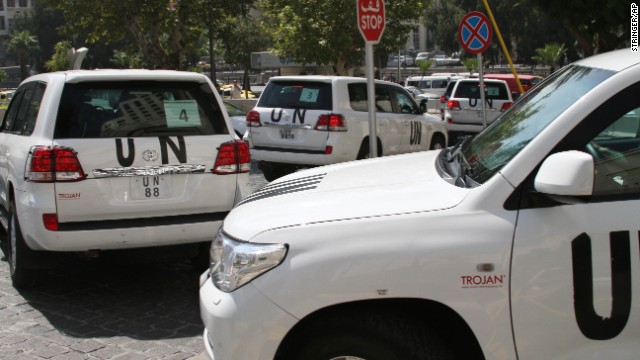 A U.N. team leaves its Damascus, Syria, hotel in a convoy on Monday, August 26. The team was to investigate an alleged chemical attack that killed hundreds last week in a suburb of the Syrian capital. Sniper fire hit a vehicle used by the U.N. chemical weapons investigation team multiple times Monday, according to the United Nations.
A U.N. team leaves its Damascus, Syria, hotel in a convoy on Monday, August 26. The team was to investigate an alleged chemical attack that killed hundreds last week in a suburb of the Syrian capital. Sniper fire hit a vehicle used by the U.N. chemical weapons investigation team multiple times Monday, according to the United Nations.
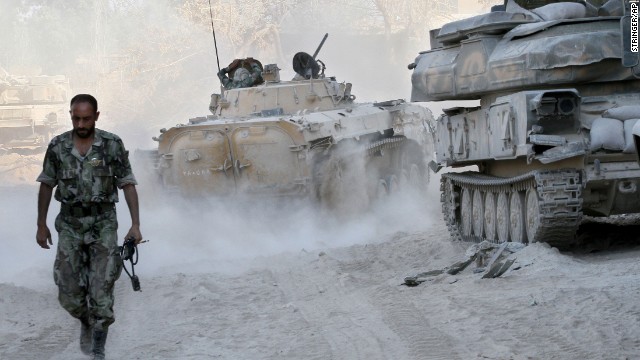 A Syrian soldier walks down a street in Damascus on Saturday, August 24.
A Syrian soldier walks down a street in Damascus on Saturday, August 24.
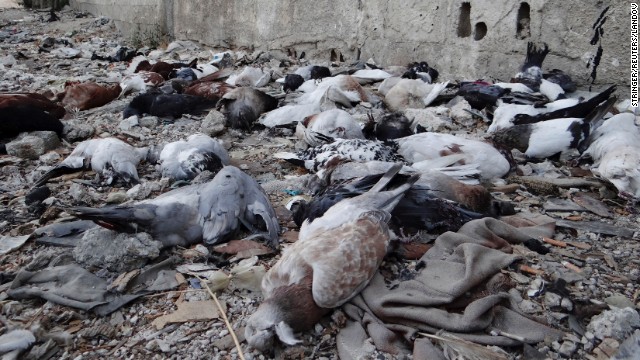 Pigeons lie dead on the ground on August 24 from after what activists say is the use of chemical weapons by government forces in the Damascus suburb of Arbeen.
Pigeons lie dead on the ground on August 24 from after what activists say is the use of chemical weapons by government forces in the Damascus suburb of Arbeen.
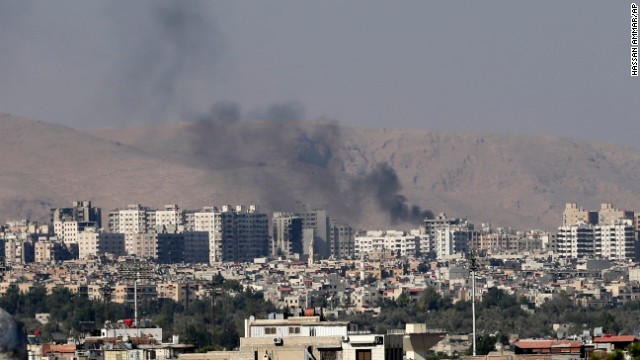 Columns of smoke rise in Barzeh after heavy shelling on Friday, August 23.
Columns of smoke rise in Barzeh after heavy shelling on Friday, August 23.
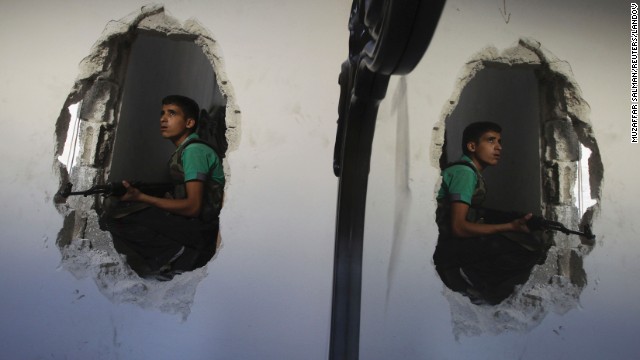 A young Free Syrian Army fighter is reflected in a mirror as he takes position in a house in Aleppo on Thursday, August 22.
A young Free Syrian Army fighter is reflected in a mirror as he takes position in a house in Aleppo on Thursday, August 22.
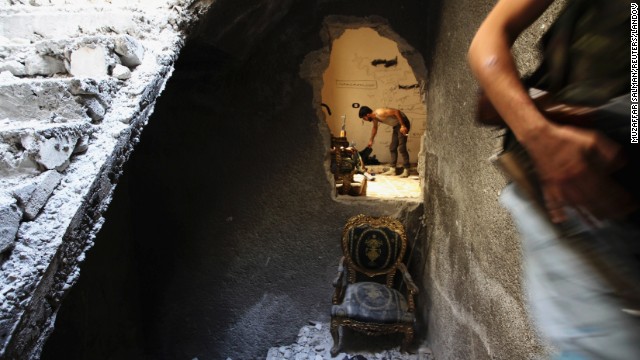 Rebels move around a building in Aleppo on August 22.
Rebels move around a building in Aleppo on August 22.
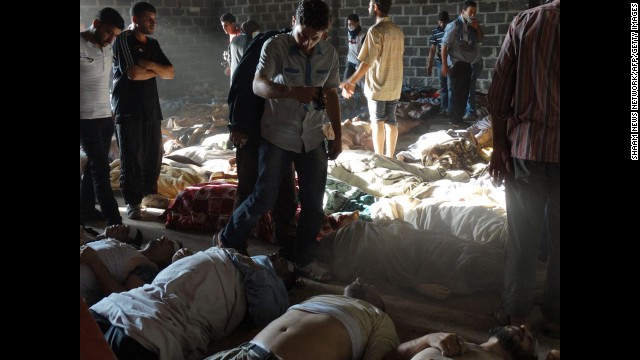 Syrian rebels claim pro-government forces used chemical weapons to kill citizens outside Damascus on Wednesday, August 21. People inspect bodies in this photo released by the Syrian opposition Shaam News Network.
Syrian rebels claim pro-government forces used chemical weapons to kill citizens outside Damascus on Wednesday, August 21. People inspect bodies in this photo released by the Syrian opposition Shaam News Network.
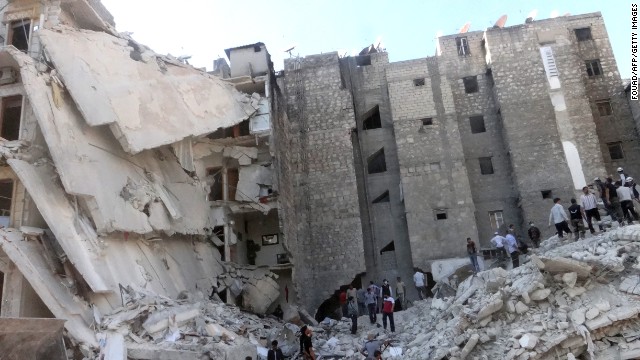 People search the rubble of a bombed building in Aleppo, Syria, on Friday, August 16.
People search the rubble of a bombed building in Aleppo, Syria, on Friday, August 16.
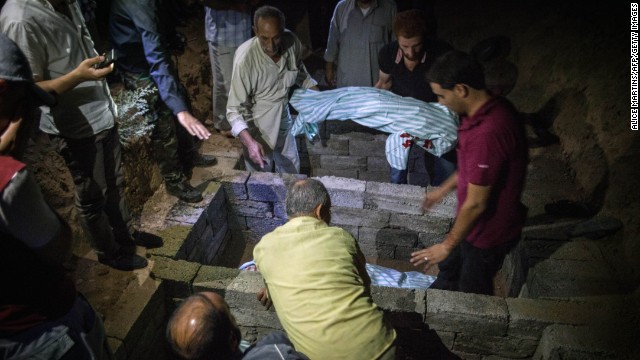 Men bury the bodies of six members of the same family killed in a bombing in Raqqa on Saturday, August 10.
Men bury the bodies of six members of the same family killed in a bombing in Raqqa on Saturday, August 10.
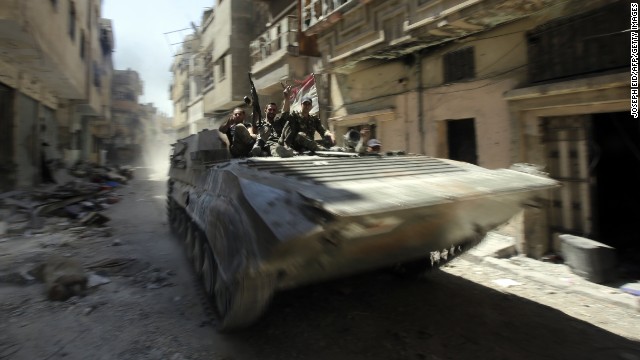 Syrian Army soldiers patrol a devastated street in Homs on Wednesday, July 31.
Syrian Army soldiers patrol a devastated street in Homs on Wednesday, July 31.
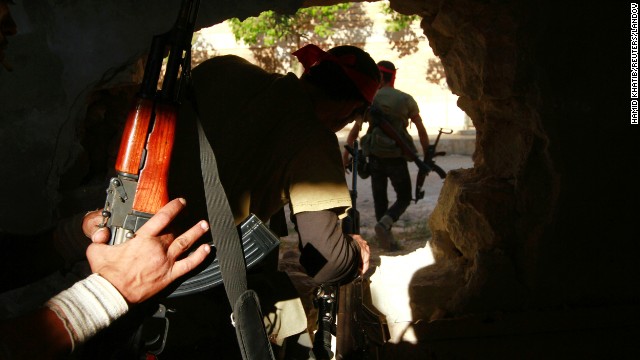 Free Syrian Army fighters move through a hole in a wall in Khan al-Assal on Monday, July 22, after seizing the town.
Free Syrian Army fighters move through a hole in a wall in Khan al-Assal on Monday, July 22, after seizing the town.
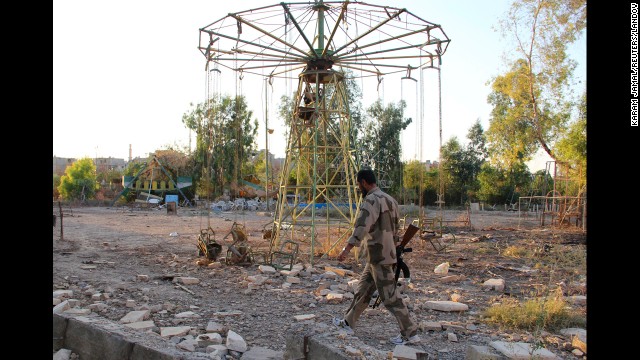 A rebel fighter walks past swings in a deserted playground in Deir al-Zor, Syria, on Sunday, July 21.
A rebel fighter walks past swings in a deserted playground in Deir al-Zor, Syria, on Sunday, July 21.
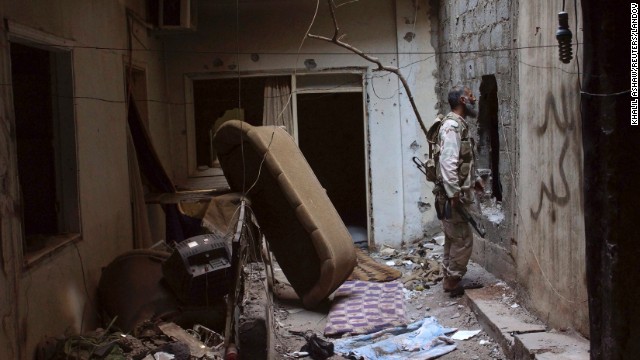 A rebel fighter speaks with a fellow fighter through a hole in a wall in Deir al-Zor on July 21.
A rebel fighter speaks with a fellow fighter through a hole in a wall in Deir al-Zor on July 21.
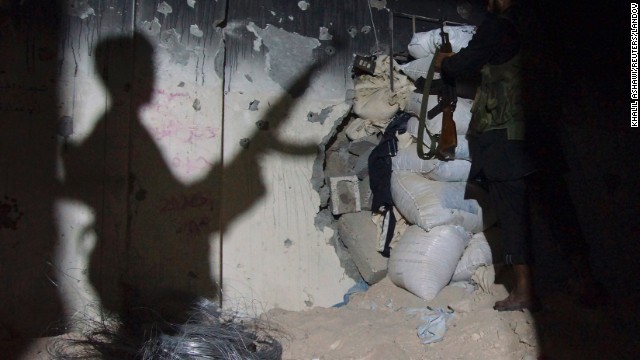 A Free Syrian Army fighter casts a shadow on a wall as he carries his weapon in a shelter in Deir al-Zor on Thursday, July 18.
A Free Syrian Army fighter casts a shadow on a wall as he carries his weapon in a shelter in Deir al-Zor on Thursday, July 18.
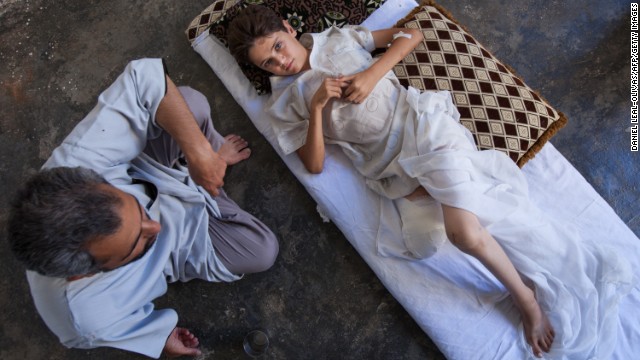 Yahya Sweed, 13, is comforted by his father as he lies on a bed in Kfar Nubul on Tuesday, July 16. The boy was injured by shrapnel, resulting in the amputation of his right leg.
Yahya Sweed, 13, is comforted by his father as he lies on a bed in Kfar Nubul on Tuesday, July 16. The boy was injured by shrapnel, resulting in the amputation of his right leg.
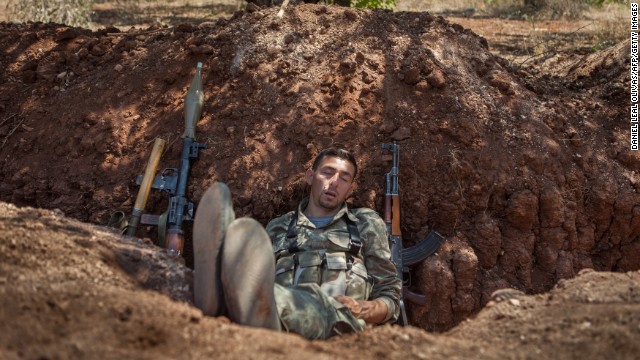 A rebel fighter naps in a trench about 300 feet from the Syrian government forces' positions along the highway connecting Idlib with Latakia on Monday, July 15.
A rebel fighter naps in a trench about 300 feet from the Syrian government forces' positions along the highway connecting Idlib with Latakia on Monday, July 15.
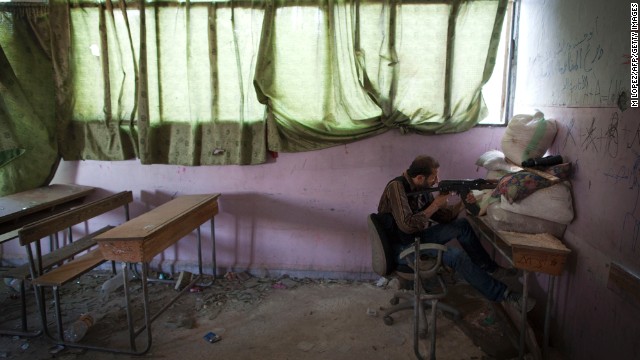 A rebel fighter uses a hole in the wall of a destroyed school to aim at Syrian government forces in the Izaa district of Aleppo on Sunday, July 14.
A rebel fighter uses a hole in the wall of a destroyed school to aim at Syrian government forces in the Izaa district of Aleppo on Sunday, July 14.
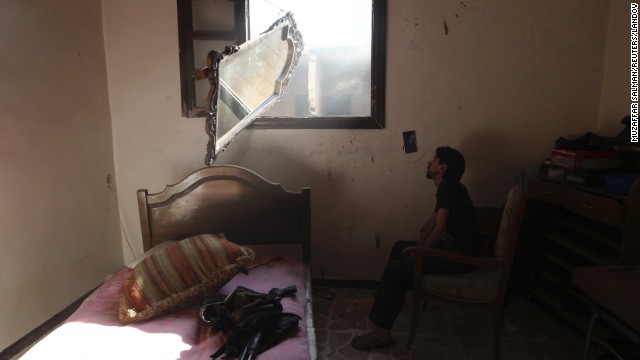 A Free Syrian Army fighter uses a mirror to scope out snipers loyal to Syrian President Bashar al-Assad in Aleppo on Friday, July 12.
A Free Syrian Army fighter uses a mirror to scope out snipers loyal to Syrian President Bashar al-Assad in Aleppo on Friday, July 12.
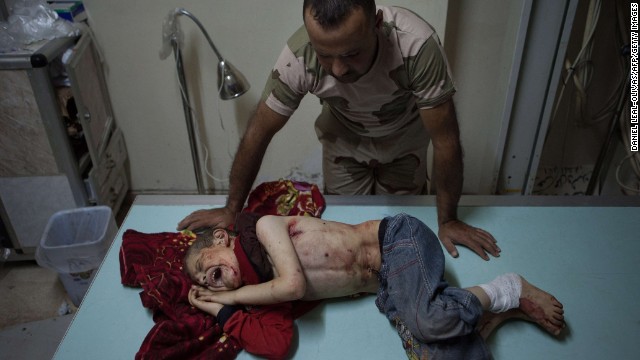 A Free Syrian Army fighter stands over a boy who was injured during shelling in Al-Bara on Monday, July 8.
A Free Syrian Army fighter stands over a boy who was injured during shelling in Al-Bara on Monday, July 8.
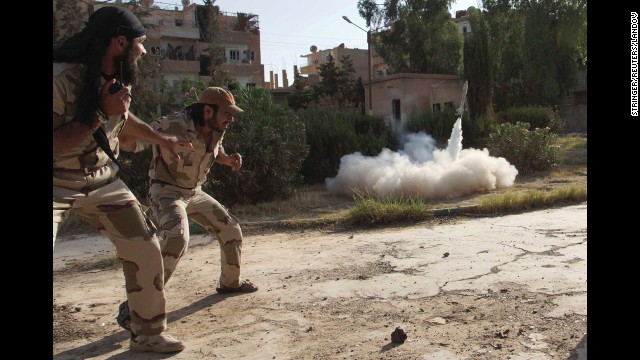 Members of the Free Syrian Army fire a homemade rocket toward regime forces in Deir al-Zor on Sunday, June 16.
Members of the Free Syrian Army fire a homemade rocket toward regime forces in Deir al-Zor on Sunday, June 16.
Syrian rebels leave their position in the northwestern town of Maaret al-Numan on Thursday, June 13. The White House said that the Syrian government has crossed a "red line" with its use of chemical weapons and announced it would start arming the rebels.
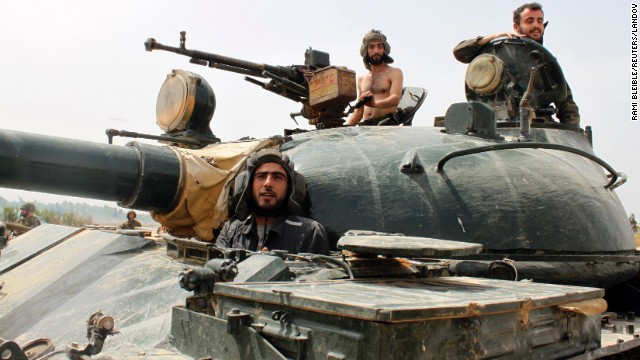 Forces loyal to Syrian President Bashar al-Assad are seen near Qusayr on Thursday, May 30.
Forces loyal to Syrian President Bashar al-Assad are seen near Qusayr on Thursday, May 30.
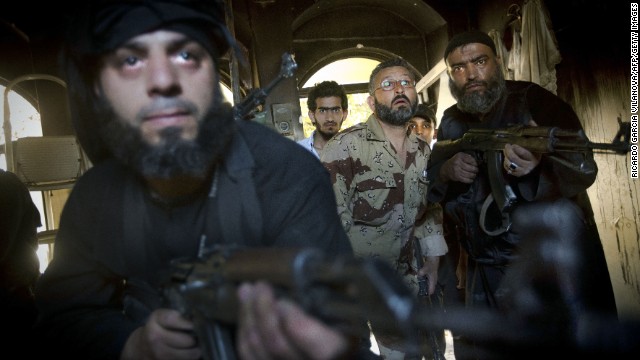 Syrian rebels take position in a house during clashes with regime forces in the old city of Aleppo on May 22.
Syrian rebels take position in a house during clashes with regime forces in the old city of Aleppo on May 22.
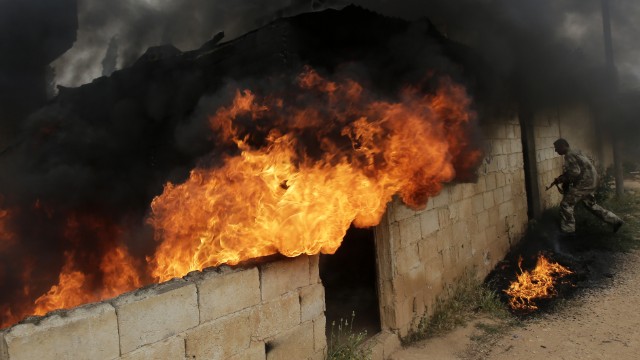 Syrian army soldiers take control of the village of Western Dumayna north of the rebel-held city of Qusayr on Monday, May 13. Syrian troops captured three villages in Homs province, allowing them to cut supply lines to rebels inside Qusayr town, a military officer told AFP.
Syrian army soldiers take control of the village of Western Dumayna north of the rebel-held city of Qusayr on Monday, May 13. Syrian troops captured three villages in Homs province, allowing them to cut supply lines to rebels inside Qusayr town, a military officer told AFP.
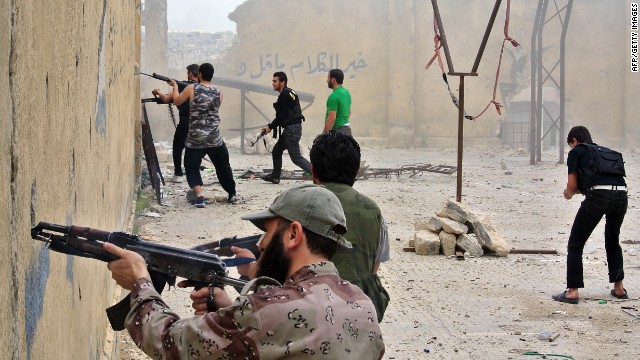 Rebel fighters fire at government forces in the northern Syrian city of Aleppo on Sunday, May 12.
Rebel fighters fire at government forces in the northern Syrian city of Aleppo on Sunday, May 12.
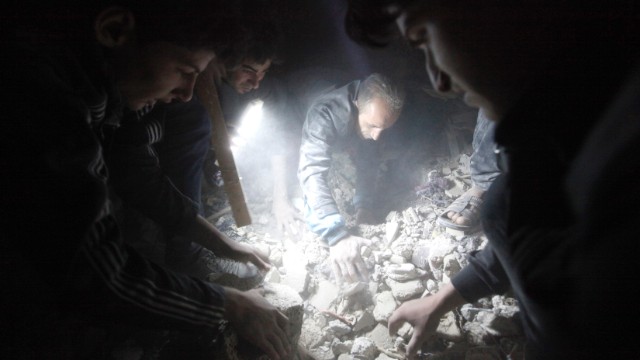 Searchers use a flashlight as they look for survivors among the rubble created by what activists say was a missile attack from the Syrian regime, in Raqqa province, Syria, on April 25.
Searchers use a flashlight as they look for survivors among the rubble created by what activists say was a missile attack from the Syrian regime, in Raqqa province, Syria, on April 25.
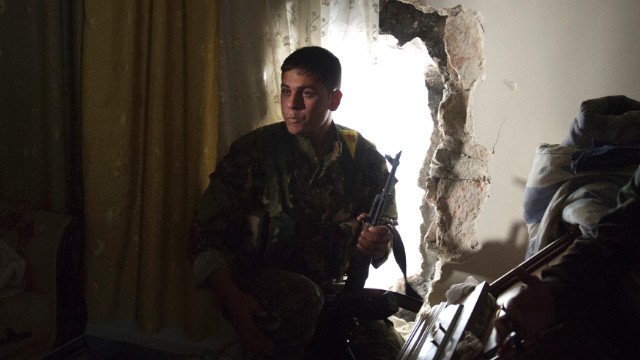 A Kurdish fighter from the "Popular Protection Units" (YPG) takes position inside a building in the majority-Kurdish Sheikh Maqsood area of Aleppo, on Apri. 21.
A Kurdish fighter from the "Popular Protection Units" (YPG) takes position inside a building in the majority-Kurdish Sheikh Maqsood area of Aleppo, on Apri. 21.
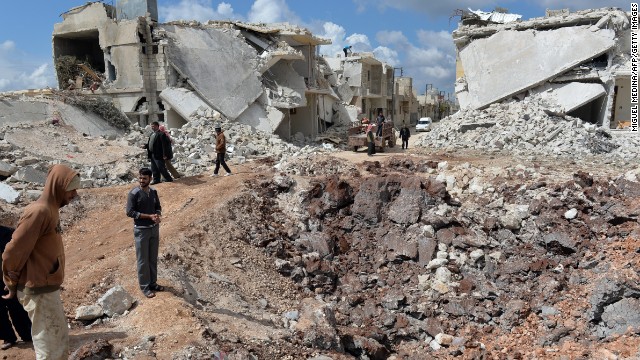 People walk past destroyed houses in the northern Syrian town of Azaz on Sunday, April 21.
People walk past destroyed houses in the northern Syrian town of Azaz on Sunday, April 21.
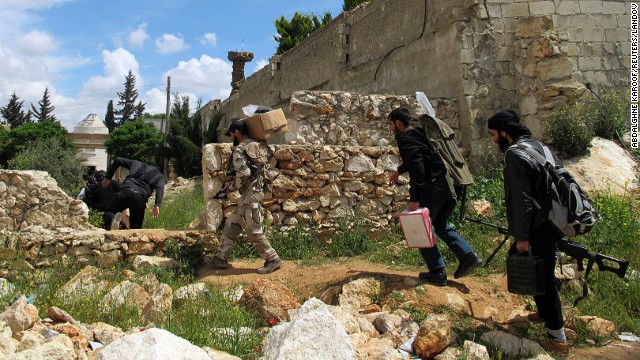 Free Syrian Army fighters take positions prior to an offensive against government forces in the Khan al-Assal area, near Aleppo on Saturday, April 20.
Free Syrian Army fighters take positions prior to an offensive against government forces in the Khan al-Assal area, near Aleppo on Saturday, April 20.
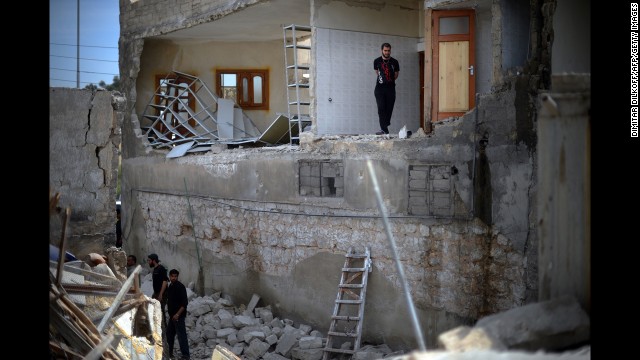 Men inspect damage at a house destroyed in an airstrike in Aleppo on April 15.
Men inspect damage at a house destroyed in an airstrike in Aleppo on April 15.
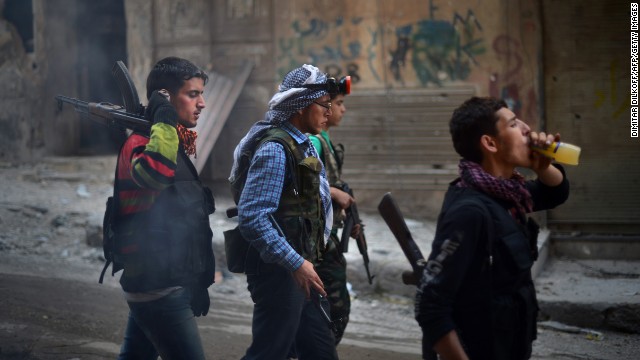 Syrian and Kurdish rebel fighters walk in the Sheikh Maqsud district of Aleppo on April 14.
Syrian and Kurdish rebel fighters walk in the Sheikh Maqsud district of Aleppo on April 14.
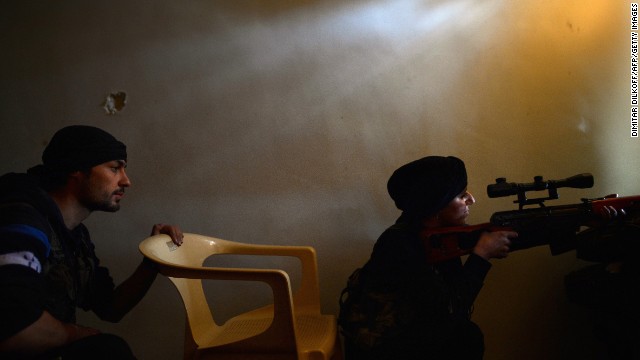 A female rebel monitors the movement of Syrian government forces in Aleppo's Sheikh Maqsud neighborhood on Thursday, April 11.
A female rebel monitors the movement of Syrian government forces in Aleppo's Sheikh Maqsud neighborhood on Thursday, April 11.
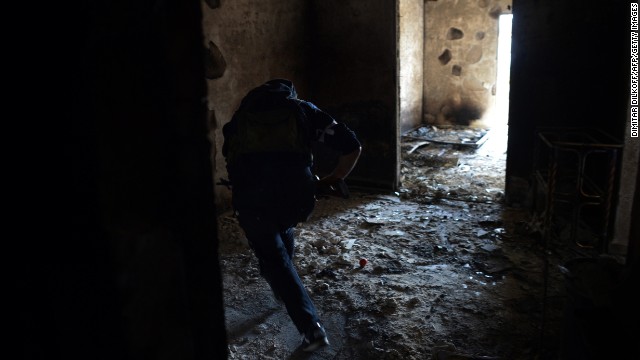 A rebel runs to avoid sniper fire from Syrian government forces in Aleppo on April 11.
A rebel runs to avoid sniper fire from Syrian government forces in Aleppo on April 11.
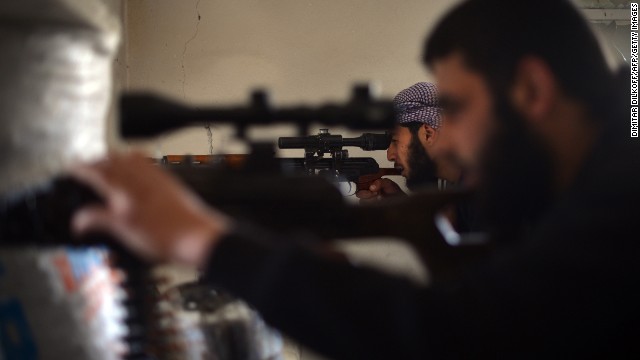 Syrian rebels observe the movement of Syrian government forces around Al-Kendi hospital in Aleppo on Wednesday, April 10.
Syrian rebels observe the movement of Syrian government forces around Al-Kendi hospital in Aleppo on Wednesday, April 10.
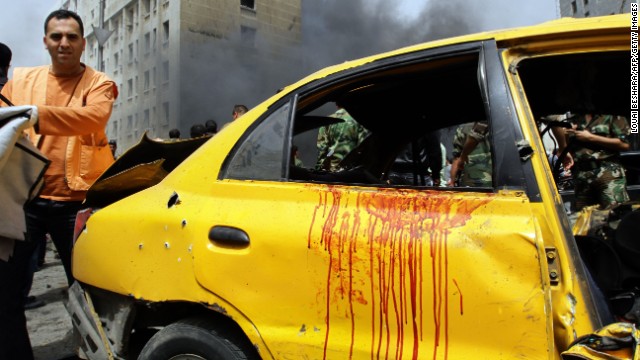 Rescue teams and security forces check out the scene of a deadly car bomb explosion in Damascus on April 8.
Rescue teams and security forces check out the scene of a deadly car bomb explosion in Damascus on April 8.
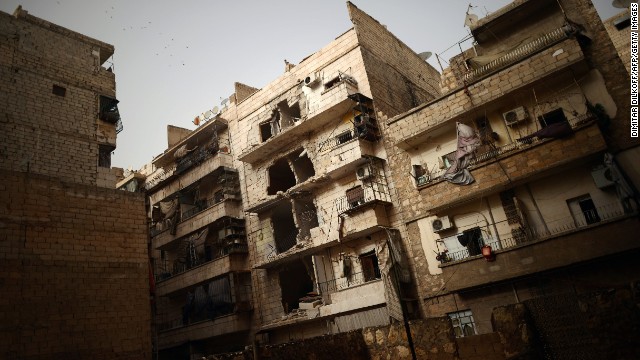 The fighting has taken a toll on buildings in Aleppo's Saladin district, seen here on April 8.
The fighting has taken a toll on buildings in Aleppo's Saladin district, seen here on April 8.
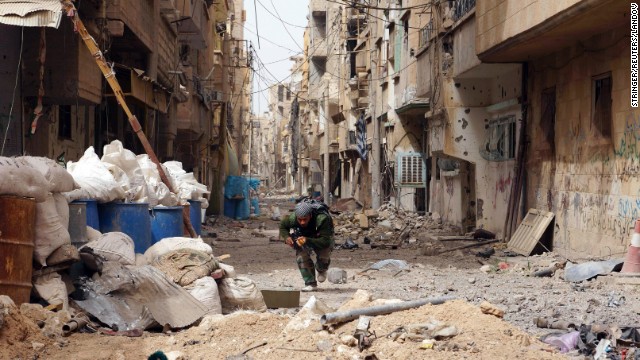 A Syrian rebel runs for cover in Deir ez-Zor on April 2.
A Syrian rebel runs for cover in Deir ez-Zor on April 2.
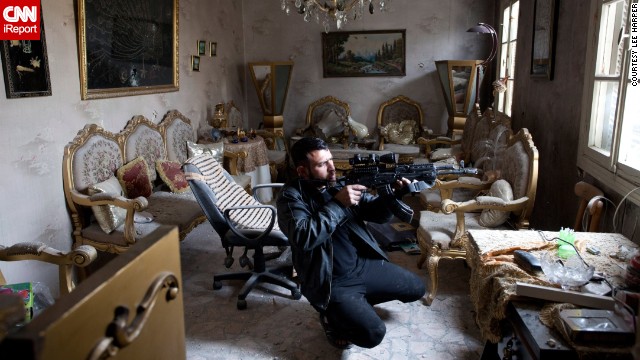 A rebel checks for snipers across the street toward the Citadel in Aleppo, Syria, on Saturday, March 30, in this photo taken by iReporter Lee Harper.
A rebel checks for snipers across the street toward the Citadel in Aleppo, Syria, on Saturday, March 30, in this photo taken by iReporter Lee Harper.
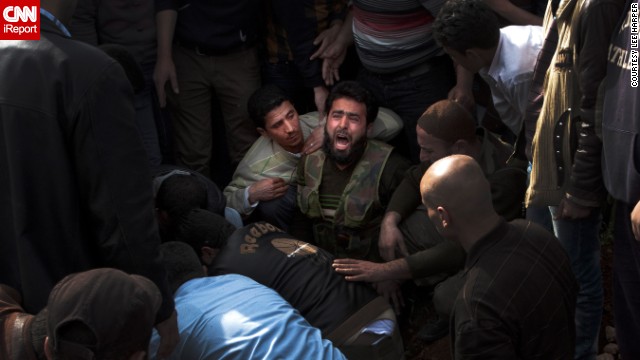 A Free Syrian fighter mourns the death of a friend in Aleppo on March 30, in this photo taken by iReporter Lee Harper.
A Free Syrian fighter mourns the death of a friend in Aleppo on March 30, in this photo taken by iReporter Lee Harper.
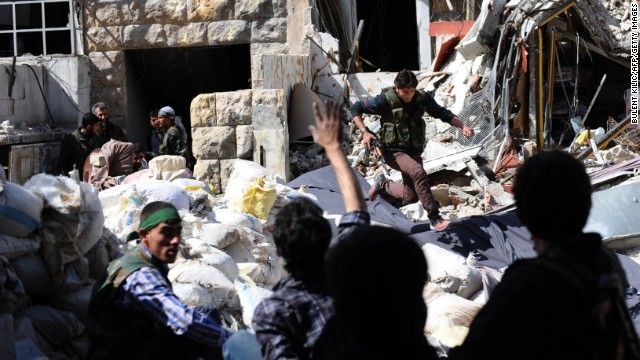 A Syrian opposition fighter runs for cover from Syrian army snipers in Aleppo on Wednesday, March 27.
A Syrian opposition fighter runs for cover from Syrian army snipers in Aleppo on Wednesday, March 27.
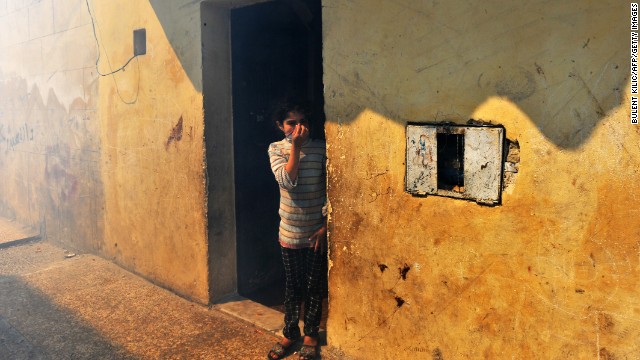 A Syrian girl covers her face to protect herself from fumes as a street covered with uncollected garbage is fumigated in Aleppo on Sunday, March 24.
A Syrian girl covers her face to protect herself from fumes as a street covered with uncollected garbage is fumigated in Aleppo on Sunday, March 24.
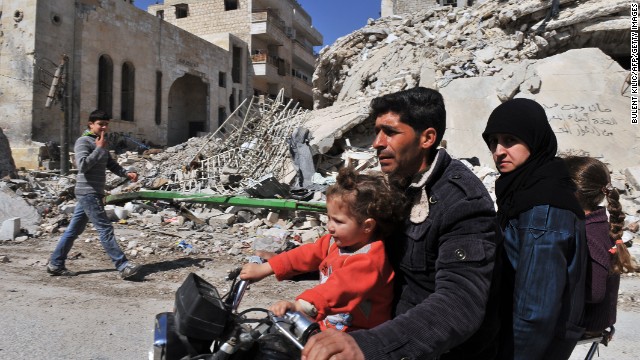 A Syrian man and his family drive past damaged buildings in Maarat al-Numan, on Wednesday, March 20.
A Syrian man and his family drive past damaged buildings in Maarat al-Numan, on Wednesday, March 20.
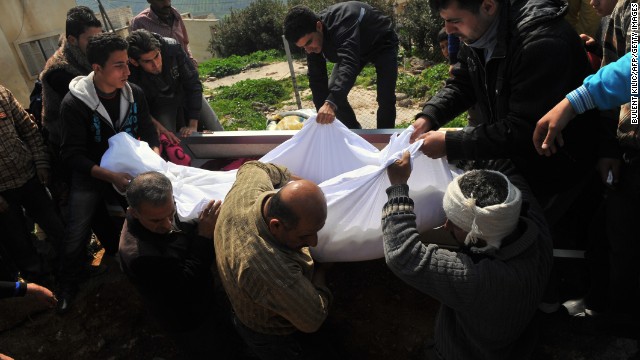 Syrians carry the body of a Syrian army soldier during a funeral ceremony in Idlib province on Tuesday, March 19.
Syrians carry the body of a Syrian army soldier during a funeral ceremony in Idlib province on Tuesday, March 19.
STORY HIGHLIGHTS
- NEW: Obama says military plan would let U.S. degrade Syria's chemical weapons capabilities
- NEW: There's "a lot of dispersal" of Syria's military assets, source says
- NEW: Boehner and Pelosi express support for action
- More than 2 million Syrians have fled the country, U.N. says
Should the West intervene in Syria? Tell us what you think. Read a version of this story in Arabic.
(CNN) -- [Breaking news update, 11:45 a.m. ET]
The leaders of both parties in the House of Representatives emerged from a White House meeting to endorse U.S. military action against Syria, with House Speaker John Boehner saying only the United States has the "the capability and capacity" to respond to the use of chemical weapons. House Minority Leader Nancy Pelosi added that Washington must respond to actions "outside the circle of civilized human behavior."
[Original story published at 11:35 a.m. ET]
(CNN) -- Working to persuade Congress to support a U.S. attack on Syria, President Barack Obama vowed Tuesday that the military plan would deliver important results while keeping the United States out of a larger war.
"This is not Iraq, and this is not Afghanistan," Obama told reporters before a meeting with lawmakers.
"This is a limited, proportional step that will send a clear message -- not only to the Assad regime, but also to other countries that may be interested in testing some of these international norms -- that there are consequences."
The United States, along with NATO and several other countries, blames Syrian President Bashar al-Assad's regime for a chemical weapons attack that's believed to have killed more than 1,000 people -- including, Obama said Tuesday, more than 400 children.
"This norm against using chemical weapons -- that 98 percent of the world agrees to -- is there for a reason, because we recognize that there are certain weapons that, when used, can not only end up resulting in grotesque deaths, but also can end up being transmitted to non-state actors, can pose a risk to allies and friends of ours like Israel, like Jordan, like Turkey," Obama said.
Obama said failing to punish Syria would send "a message that international norms around issues like nuclear proliferation don't mean much," he added.
Syria denies the accusations, and accuses rebels of using chemical weapons. Rebel groups blame the Syrian regime.
Obama said the U.S. military plan "gives us the ability to degrade Assad's capabilities when it comes to chemical weapons.
"It also fits into a broader strategy that we have to make sure that we can bring about over time the kind of strengthening of the opposition and the diplomatic and economic and political pressure required so that ultimately we have a transition that can bring peace and stability, not only to Syria, but to the region."
But the threat of a U.S. attack has, as expected, led to "a lot of dispersal" of Syria military assets in recent days, according to a US official with direct access to the latest information. The U.S. military needs to continuously update its target lists, the official said.
And although U.S. Secretary of State John Kerry said Sunday that the prospect of strikes has resulted in about 100 defections from the Syrian military, the U.S. official who spoke to CNN Tuesday said there have been no major or significant defections.
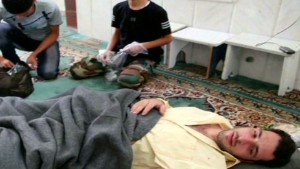 What are the 'signatures of sarin'?
What are the 'signatures of sarin'?
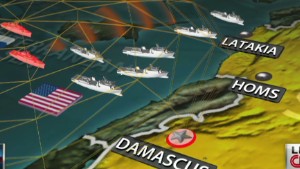 Russia watching Syria's back
Russia watching Syria's back
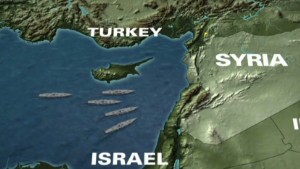 Pentagon: Syria can't hide key targets
Pentagon: Syria can't hide key targets
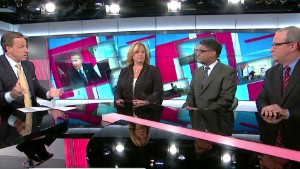 Will GOP opposition galvanize Dems?
Will GOP opposition galvanize Dems?
Among the top U.S. lawmakers meeting Tuesday with Obama were House Speaker John Boehner and Minority Leader Nancy Pelosi.
In brief remarks, Boehner said he supports Obama's call for military action. "This is something that the United States as a country needs to do," he told reporters.
Pelosi also expressed support for action, saying al-Assad "crossed a line" with the use of chemical weapons "and we must respond."
Gen. Martin Dempsey, chairman of the Joint Chiefs of Staff, Secretary of State John Kerry and Defense Secretary Chuck Hagel also were present.
The White House push comes after al-Assad once again raised the specter of an all-out regional war if the United States strikes.
Syria's allies Russia and China, meanwhile, remain steadfastly opposed to military action, unconvinced by evidence that the United States and France say shows al-Assad's forces used chemical weapons in an August 21 attack around Damascus.
Dempsey, Kerry and Hagel are scheduled to appear before the Senate Foreign Relations Committee later Tuesday to press the case for action against Syria, a senior State Department official said.
Kerry will argue that a failure to act "unravels the deterrent impact of the international norm against chemical weapons use," said the official, who spoke on condition of anonymity.
A senior Pentagon official told CNN Dempsey will focus in his testimony on answering questions from the members about the use of military force, rather than making an overt case for military action. This would be in line with Dempsey's views that the military will be ready to do whatever the president orders.
It will mainly be Hagel who makes the case that the use of force is warranted, a second senior defense official said. Both declined to be identified because they were speaking in advance of the hearing.
Obama is expected to meet with leaders of the key national security committees in the House and Senate.
Administration officials will also be conducting classified briefings on Syria for Congress nearly every day this week.
Israeli missile test
Amid heightened tension in the region, Israel carried out a missile test Tuesday morning in the Mediterranean -- a launch detected by a Russian early warning system before it was confirmed by Israeli authorities,sending ripples of anxiety among observers.
Israel's Ministry of Defense said it and the U.S. Missile Defense Agency "completed a successful flight test (of the) new version of the Sparrow target missile."
The trial was carried out from an Israeli test range over the Mediterranean Sea, it said. The Arrow defense system successfully detected and tracked the system, it added.
Earlier, a Ministry of Defense Facebook post said an Anchor "target" missile was the type tested.
Arieh Herzog, a former head of Israel's missile defense program who was present at the Israeli air force test facility in central Israel when the test was conducted, told CNN it was intended to trial the new Sparrow target missile.
The target missile, launched from an aircraft, simulates a real, incoming, long range missile, he said.
 Leader of the Free Syrian Army speaks
Leader of the Free Syrian Army speaks
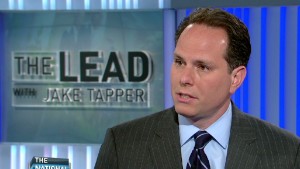 Analysis: Obama not afraid to use force
Analysis: Obama not afraid to use force
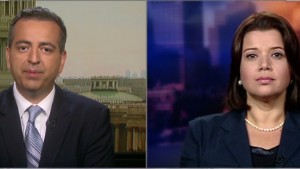 McCain: Good strategy may be effective
McCain: Good strategy may be effective
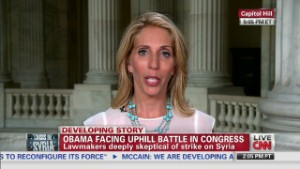 On Syria, Obama faces uphill battle
On Syria, Obama faces uphill battle
A U.S. official told CNN it was "an expected Israeli system test" in the eastern Mediterranean Sea. The official said it was up to the Israelis to explain exactly what they were testing.
Pentagon spokesman George Little said the United States had "provided technical assistance and support" to the Israeli military for the flight test, in line with regular cooperation on long-range missile defense projects.
"The test was long planned to help evaluate the Arrow Ballistic Missile Defense system's ability to detect, track, and communicate information about a simulated threat to Israel," he said. "This test had nothing to do with United States consideration of military action to respond to Syria's chemical weapons attack."
A U.S. military official was earlier adamant that the event "did not involve U.S. forces."
FiveU.S. warships were in the Mediterranean Sea last week.
Ben Goodlad, a senior defense analyst at IHS Jane's, said that a target missile "has similar ballistic characteristics as a missile. However, it does not feature a warhead and is intended to merely simulate a launch in order to test detection, tracking and interception capabilities."
This is likely why there was no reported missile strike, he said. Any missiles fired against Syria from vessels in the Mediterranean would be Tomahawk cruise missiles, he said, "which follow a far flatter trajectory than ballistic missiles and would not be mistaken as such by early warning radar."
Russia's Defense Ministry said it detected the launch of two "ballistic objects" from the Mediterranean Sea toward the eastern Mediterranean coast at 2:16 a.m. ET, Russian news agency RIA-Novosti reported. Defense Minister Sergey Shoigu informed President Vladimir Putin of the development, it added.
Bill Neeley, international editor for CNN affiliate ITN, tweeted from Damascus that there have been "no major explosions in #Damascus area that might have been from missiles fired from Med. Several blasts 2 hrs ago from army to rebel areas."
'A lot of distrust'
In the United States, the Obama administration is expected to increase its lobbying efforts as lawmakers return to Capitol Hill for briefings.
A leading member of one of the key U.S. committees, House Armed Services Committee Chairman Buck McKeon, said the administration will have to overcome "a lot of distrust among the American people" about the intelligence that it says shows Syria's government used chemical weapons.
"There will be a real questioning as to the veracity of the evidence and if this really happened or not," McKeon, R-California, said in an interview with CNN's Barbara Starr. "It will be necessary to explain and prove to the American people, and I think the only person who can really do that is the president of the United States."
The United States and several of its leading allies accuse al-Assad's forces of resorting to poison gas attacks against rebel forces and civilians, including an August 21 attack near Damascus the Obama administration says killed more than 1,400 people.
Obama said Saturday that the use of chemical weapons is "a challenge to the world" that threatens U.S. allies in the region -- but he said he would seek the authorization of Congress before unleashing American force.
No vote on military action is expected until after lawmakers reconvene from recess on September 9.
More support for the opposition
U.S. plans for strikes against Syria may be coupled with increased support for rebel forces in that country's civil war, two leading Republican senators said after meeting with the president on Monday.
Obama huddled in the Oval Office with McCain and Sen. Lindsey Graham, both members of the Senate Armed Services Committee, the White House said. After the meeting, McCain and Graham said the United States needs to help the rebels reverse battlefield gains by troops loyal to al-Assad.
"We still have significant concerns, but we believe there is in formulation a strategy to upgrade the capabilities of the Free Syrian Army and to degrade the capabilities of Bashar al-Assad," said McCain, the ranking Republican on the armed services committee.
Is it 'High Noon' for Obama on Syria?
McCain, who has called for U.S. intervention in Syria since early 2012, criticized Obama's decision to seek a vote before striking. But he said it would be "catastrophic" for Congress to reject the president's call to authorize military force.
Syria missile strike: What would happen next?
"It would undermine the credibility of the United States of America and the president of the United States," McCain said. "None of us want that."
In an interview with CNN Tuesday, McCain added that he wants Congress to vote for a resolution that is "meaningful, impactful and can shift the balance of power on the ground in Syria."
McCain, a former Republican presidential candidate, said delays to U.S. military strikes are giving the Syrian military time to move its assets into safety and risks putting more civilians in danger.
Graham told CNN that Obama must do more to convince the American people of the need for action on Syria. The senator believes Iran will be emboldened to continue its pursuit of nuclear weapons if no international action is taken against Syria, and the region will be further destabilized.
"If we get Syria right, maybe we can avoid a war between Israel and Iran which we would surely get (dragged) into," he said. "If we fail to stand up for the right thing and send the right message, the whole region will go up in flames."
Military has concerns about Syria mission
Lawmaker's 'big question'
The threat of a regional war is an angle that the Syrian president continues to flag.
"The Middle East is a powder keg, and the fire is approaching today," he told French newspaper Le Figaro in an interview Monday.
"One must not speak only of the Syrian response, but rather what could be produced after the first strike," he said. "Because nobody can know what will happen."
Neither Washington nor Paris has "a single proof" that the Syrian government was behind the alleged chemical weapons attack against civilians on August 21, he said.
Obama would have gone back to the U.N. Security Council if he were a strong leader, Assad said, but instead he has given in to pressure to act from within the United States.
Sample analysis
Syria has repeatedly denied being behind the August 21 attack and accuses rebel fighters of using chemical weapons on government troops.
U.N. weapons inspectors left Syria Saturday with evidence that will determine whether poison gas was used in that attack and tests on those samples are being conducted "as fast as it is possible to do within the scientific constraints," said Martin Nesirky, spokesman for Secretary-General Ban Ki-moon.
The United Nations has said more than 100,000 people -- including many civilians -- have been killed in Syria since a popular uprising spiraled into a civil war in 2011. Syrian opposition activists reported another 107 dead on Monday, mostly in Damascus and its suburbs.
Numbers released by the United Nations Tuesday point to the staggering impact the war has had on the nation.
The number of Syrians who have fled their war-ravaged country has risen above 2 million, the U.N. refugee agency reported, an increase of nearly 1.8 million people over the past 12 months.
'Red line' debate: Are chemical weapons worse?
http://bleacherreport.com/articles/1758843-former-wbo-heavyweight-champion-tommy-morrison-passes-away-at-age-44?utm_source=cnn.com&utm_medium=referral&utm_camp aign=editorialNO AMNESTY
Don't reward the criminal actions of millions of illegal aliens by giving them citizenship.
Sign in and post comments here.
Please support our fight against illegal immigration by joining ALIPAC's email alerts here https://eepurl.com/cktGTn


 LinkBack URL
LinkBack URL About LinkBacks
About LinkBacks




 Reply With Quote
Reply With Quote


JOE BIDEN WANTS TO BRING IN GAZA RESIDENTS AND GIVE THEM...
05-02-2024, 01:19 PM in Videos about Illegal Immigration, refugee programs, globalism, & socialism